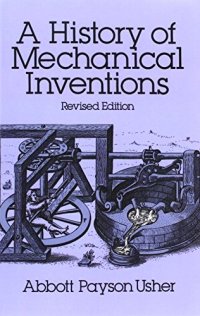
Ebook: A History of Mechanical Inventions
Author: Abbott Payson Usher
- Genre: History
- Tags: Исторические дисциплины, История науки и техники
- Year: 2011
- Publisher: Dover Publications
- Edition: Revised
- Language: English
- epub
"The book is without peer in its field." — American Scientist
In this completely revised and enlarged edition of a classic work in the history of technology, a noted scholar explores the importance of technological innovation in the cultural and economic history of the West.
Following an introductory discussion of the place of technology in economic history, the author offers a penetrating historical analysis of social change. Within this context he develops a theory of invention based on Gestalt psychology and a concept of social evolution as continuous development from antiquity to the present. Emphasis is placed on the role of economic forces in the development of technology, with scientific concepts also playing an important role in bringing about change.
The latter part of the book focuses on the production and control of power in general, and in particular on a number of important operative mechanisms. Thus we read thought-provoking accounts of the technology of textile manufacture from primitive times, of water wheels and windmills, water clocks, and mechanical clocks, and the work of Leonardo da Vinci. The development of printing is carefully studied, not only for its intrinsic interest, but because of its importance for the history of science. Other topics include the production and application of power (1500–1830), machine tools and quantity production, the production and distribution of power since 1832, and the role of Asia Minor as a source of techniques which dominated the Middle Ages and the modern period as well.
Thoroughly researched and cogently reasoned, A History of Mechanical Inventions belongs in the library of anyone interested in the history of science and invention, as well as the relationship of technology to economic and social history.
"Throughout the book there is constant proof of the author's wide learning and varied intellectual interests." — The New York Times